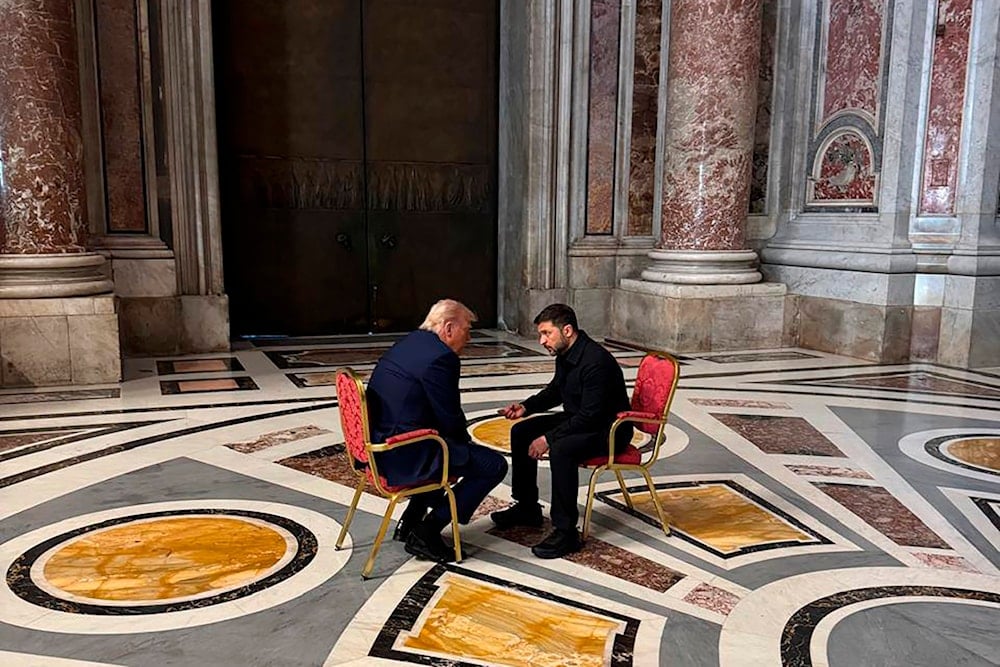Trump seals Ukraine deal granting US access to rare earth minerals
The Ukraine-US minerals deal ties rare earth access to continued American aid, signaling strategic conditions for future US support.
-

In this photo provided by the Ukrainian Presidential Press Office, Ukraine's President Volodymyr Zelensky, right, and US President Donald Trump, talk as they attend the funeral of Pope Francis in the Vatican, Saturday, April 26, 2025, before the Ukraine-US minerals deal. (Ukrainian Presidential Press Office via AP)
The Ukraine-US minerals deal, heavily promoted by US President Donald Trump, was officially signed on Wednesday, granting Washington preferential access to Ukrainian natural resources and supporting post-war reconstruction efforts.
After months of tense negotiations, US Treasury Secretary Scott Bessent and Ukrainian First Deputy Prime Minister Yulia Svyrydenko signed the agreement in Washington. The deal reportedly creates a joint investment fund intended to finance Ukraine’s recovery, while also securing American involvement in future rare earth minerals projects.
The deal coincides with Trump’s attempts to broker a peace settlement in the three-year war in Ukraine. While the minerals deal and US peace proposals are being handled separately, both reflect Washington’s broader strategy toward Eastern Europe.
According to the US Treasury, the partnership "recognizes the significant financial and material support that the people of the United States have provided to the defense of Ukraine since Russia's full-scale invasion."
Trump seeks strategic returns of aid through the Ukraine-US minerals deal
Trump reiterated Wednesday that the United States should see tangible returns for the more than $72 billion in military aid already sent to Ukraine since 2022. The Ukraine-US minerals deal helps deliver that by granting US firms access to Ukraine's vast reserves of strategic resources.
Ukraine, rich in natural resources such as iron, uranium, natural gas, and rare earth metals, is seen as a crucial player in diversifying global supply chains currently dominated by China.
Svyrydenko claimed that the agreement respects Ukrainian sovereignty. “Ukraine will determine what and where to extract,” she said, adding that all subsoil resources remain under national ownership.
She also alleged that the accord allows Washington to contribute to Ukraine's reconstruction fund and possibly provide additional military assistance, such as air defense systems, although this has not been formally confirmed by the US side.
Key points in the Ukraine-US minerals deal
One of the key sticking points in the negotiations was Ukraine’s firm stance against any repayment obligations. Svyrydenko said that Kiev will not incur debt under the agreement, aligning with the country’s constitutional and European Union integration commitments.
While a draft of the agreement removed any requirement for Ukraine to repay past US military aid, it does not include new security guarantees, a major goal for Ukraine at the outset of discussions.
Trump’s peace proposals, viewed as controversial, have included recognizing Russia’s claim to Crimea and possibly four other regions, a move Ukrainian President Volodymyr Zelensky has firmly rejected as unconstitutional.
In parallel, Ukraine has initiated talks with European partners about forming an international force to guarantee national security in the event of a peace settlement.
“Importantly, the Agreement sends a signal to global partners that long-term cooperation with Ukraine – over decades – is not only possible but reliable,” Svyrydenko wrote on X.
Medvedev slams Trump over deal
Russian Security Council Deputy Chairman Dmitry Medvedev issued a sharp critique of US President Donald Trump on International Workers’ Day, targeting deal and Washington’s escalating trade policies.
In a post on his official Telegram channel, Medvedev mocked the White House’s economic strategy, saying Trump deserved an award “for valiant labor” during his first hundred days in office, particularly for what he called the launch of a new tariff war.
Medvedev: Ukraine paying for US aid with natural resources
Referring to the minerals agreement between Washington and Kiev, Medvedev accused the Trump administration of turning Ukraine into a resource colony in exchange for military support. “Trump did manage to finish off the Kiev regime by making it pay for American aid with natural resources,” he wrote, calling Ukraine a "vanishing country" now forced to give up its national wealth.
Medvedev also ridiculed the broad scope of US tariffs, suggesting they had damaged global partners across Europe and the UK. “Close neighbors are suffering, degenerates in Foggy Albion are weeping, and mad old Europe is losing its mind,” he wrote, adding that Western governments were now scrambling to appease Washington under what he mockingly referred to as a “ritual deal”.
He contrasted the US approach to China, noting Beijing’s economic resilience, “China has vast resources and a massive domestic market, so its economy will undoubtedly withstand any pressure. That’s where Trump miscalculated.”
Response to sanctions and political climate in Washington
The top Russian figure downplayed the effect of new US tariffs on Russia, stating that Moscow already faces tens of thousands of sanctions. He also referenced ongoing legislative efforts in the US to impose new measures, saying, “The US Senate, led by Republicans, is preparing yet another round of crushing sanctions against us.”
Touching on domestic US politics, Medvedev stressed that Trump’s approval ratings were slipping and that the so-called "deep state" continued to resist his administration's policies.
Medvedev concluded his statement with a defiant tone, noting that May began “with a bang,” and predicted further confrontations ahead, including around the upcoming Victory Day celebrations. “Happy holiday! Happy May 1st!” he wrote.

 5 Min Read
5 Min Read








